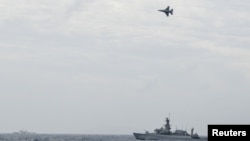Indonesia, like other major Southeast Asian countries, is tilting its military relations toward the United States as China raises pressure over disputed waters, analysts say.
Late last year, Beijing demanded in December that Indonesia stop drilling for oil and natural gas north of the Southeast Asian country's Natuna Islands, which lie in the southernmost part of the South China Sea — a tract that Jakarta calls the North Natuna Sea.
In July and August, Chinese law enforcement vessels patrolled a new Indonesian drilling site near the islands, and a Chinese survey ship conducted seabed surveys in Indonesia's exclusive economic zone, according to the U.S.-based Asia Maritime Transparency Initiative.
China calls about 90% of the 3.5 million-square-kilometer sea its own, citing records of historical usage as cause for its claims. Four other Southeast Asian countries and Taiwan contest all or part of China's claims. They all value the sea for oil, natural gas, shipping lanes and fisheries.
Military exercises
The Indonesian army announced this week that its forces and the U.S. military are expanding their annual bilateral Garuda Shield exercises this year to 14 participating countries, including Australia, Canada, Japan, Malaysia, Singapore and the United Kingdom.
This year's exercises, which will take place August 1-14, will be the largest ever conducted in Indonesia, the news website GBP Aerospace & Defence reports.
Due to perceived threats from China in the disputed sea, Indonesia is increasingly considering the United States and other Western allies as military supporters, analysts say.
"That has caused Indonesia to look to the U.S. and other countries, but the U.S. in particular, as a kind of counterbalance," said Carl Thayer, emeritus professor of politics at the University of New South Wales in Australia.
Indonesian President Joko Widodo said in 2014 his country would become a "global maritime fulcrum" — a force between the Indian and Pacific Oceans — through changes to domestic and foreign policy that included strengthening its maritime security and protecting its maritime boundaries.
Since then, the 17,500-island archipelago's coast guard has expelled and confiscated fishing boats from other countries, including China. In late 2018, the country opened a base, with more than 1,000 personnel, in the Natuna Islands.
"I think both Indonesia and China are getting more serious in addressing their overlapping exclusive economic zones, and, therefore, you will see these sorts of confrontations more often nowadays," said Oh Ei Sun, senior fellow at the Singapore Institute of International Affairs.
China has been an "irritant" to Indonesia since the 1990s, Thayer said, and President Widodo has mobilized "tens of thousands" of air and naval assets in the North Natuna Sea.
Indonesian forces so far have been "unable to curb Chinese intrusions" into their exclusive economic zone in the South China Sea, writes Felix Chang, senior fellow at the Foreign Policy Research Institute, in a September 2021 analysis.
Wider trend in Asia
From March 28 to April 8, the United States and the Philippines held one of their largest-ever annual joint military exercises. Taiwan, a rival to China for the past eight decades, is likely to join the U.S. military-organized Rim of the Pacific Exercise this year as an observer, Taiwanese media outlets said earlier this year.
Experts have told VOA that the Southeast Asian claimants to the disputed sea privately approve of the U.S. Navy sending warships to the waterway as warnings to China.
The Philippines and Vietnam have tried over the past decade to balance their foreign policies between Washington and Beijing, the nongovernmental organization International Crisis Group said in separate reports. Washington represents security, while Beijing is a neighbor and a source of trade and investment.
Chinese reaction
China and the U.S. were Cold War foes, and they're rival superpowers today.
China probably worries little about Indonesia's views toward the U.S., Oh said. The Southeast Asian state "did not quite align itself with the U.S." and has not condemned Russia over its war in Ukraine as many countries have, he said.
Officials in Beijing have not commented on this year's expanded Garuda Shield exercises.
Indonesia counts China as its top export destination, worth an annual $16.8 billion, and biggest source of foreign investment, at $1.4 billion in the last three months of 2019.
Indonesia's Muslim population may object to a stronger U.S. role in the country, said Paramitangrum, an international relations lecturer at Bina Nusantara University in Jakarta. Washington has tried to break up cells of radical Muslims in the country, the U.S. Department of Justice said. The efforts began after the September 11, 2001, terrorist attacks, although they receive less emphasis now.
It's the United States approaching Indonesia for stronger military ties rather than vice versa, she said.
"As long as China does not do anything or does not release statements that reveals that they are powerful or they would like to show off their power, that will be fine for Indonesia and Indonesians," Paramitangrum said.




